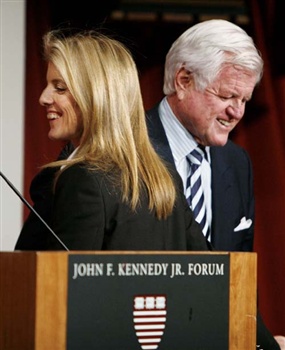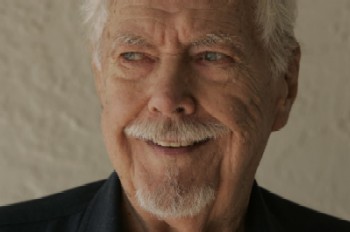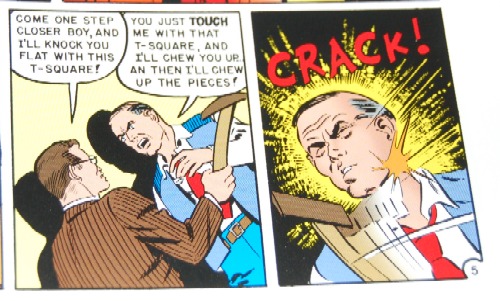
Month / November 2006
Add Another Chick Who Reads Pynchon to the List
Laura Miller weighs in. She doesn’t like it.
NYC Population Concentration in 3-D!
Graphical representation of U.S. population density.
There are many fun facts:
1. Loving Country, Texas is the least populated county in the lower forty-eight.
2. The entire state of Wyoming has fewer people than Harrisburg, PA.
3. New Jersey is the most densely populated state.
New Hope for Kareem Abdul Jabbar’s Love Life
The Australian: “In what is billed as the first study of its kind, two academics at a British university found there is no short cut to true love, it was reported today. They calculated that for every inch taller a man is than his speed-dating rivals, the number of women who want to meet him goes up by about five per cent.”
On Robert Altman
Some filmmakers unfurl pyrotechnics at their audiences, flaunting their tricks like a crass magician. Others compensate for their inability to tap into the visceral by offering cerebral puzzles. Robert Altman simply wanted his audience to observe the human condition, however painful, baroque, or unappetizing it might be.
This is a rarer sensibility than one might expect from a filmmaker, which makes Altman’s death particularly shocking. And it’s no surprise that Altman was praised and marginalized, often both at the same time, as he somehow kept on making films, many of them financed by the big studios, that were irreverent, inexorable, and often misunderstood.
It is telling that Altman’s technical innovations emerged not from the need to show off (although The Player‘s opening shot, a fabulous riff on stylistic excess, might be exempted), but from a compulsion to chronicle humanity, whether contained singularly in Philip Baker Hall’s harrowing portrait of Nixon in Secret Honor or the considerable population of characters his films were known for. I could talk endlessly about his leisurely pans and zooms, executed as if a stoner had cross-pollinated with a nouvelle vague vanguard. For McCabe and Mrs. Miller, he erected a whole town and asked each extra to fully inhabit his part. There are his multitrack audio innovations seen in Nashville. Altman didn’t tell the actors when the camera and the mike would be on them and simply had them improvise their scenes, thus removing any lingering dregs of exhibitionism and ensuring that his cast would give naturalistic performances.
 But was Altman a true naturalist? Altman’s highly entertaining The Long Goodbye is, aside from Robert Montgomery’s The Lady in the Lake, the most idiosyncratic of Raymond Chandler film adaptations, transforming Marlowe into an inveterate wisecracker contending with 1970s Southern California. And in heightening Marlowe’s sarcasm and juxtaposing this against SoCal excesses, Altman, aided by Elliott Gould’s perfect casting and Leigh Brackett’s exceptionally witty script, managed to compartmentalize genre elements, dissecting Chandler’s narrative elements (the repartee, the ladies, and Marlowe himself) while entertaining us. Consider how the opening of Brewster McCloud, where we hear “I forgot the opening line” instead of the MGM lion roar. Altman was not only concerned with how films could reflect the human condition, but how the film medium could be manipulated, perhaps dismantled completely, to favor the human condition
But was Altman a true naturalist? Altman’s highly entertaining The Long Goodbye is, aside from Robert Montgomery’s The Lady in the Lake, the most idiosyncratic of Raymond Chandler film adaptations, transforming Marlowe into an inveterate wisecracker contending with 1970s Southern California. And in heightening Marlowe’s sarcasm and juxtaposing this against SoCal excesses, Altman, aided by Elliott Gould’s perfect casting and Leigh Brackett’s exceptionally witty script, managed to compartmentalize genre elements, dissecting Chandler’s narrative elements (the repartee, the ladies, and Marlowe himself) while entertaining us. Consider how the opening of Brewster McCloud, where we hear “I forgot the opening line” instead of the MGM lion roar. Altman was not only concerned with how films could reflect the human condition, but how the film medium could be manipulated, perhaps dismantled completely, to favor the human condition
Altman’s sense of play was so heightened that I’m tempted to call him the cinematic Nabokov. MASH was a film with cojones, one of the first films depicting malaise and arrogance in a horrific war environment with careful insouciance. Thieves Like Us took the great noir classic They Live by Night and turned its characters into slow-witted robbers with the radio constantly blaring in the background. Short Cuts featured Julianne Moore delivering a monologue about her troubled marriage naked from the waist down and also included the fascinating context of Jennifer Jason Leigh talking dirty into the phone while changing the diapers.
Where other octogenarian filmmakers rested on their laurels, Altman went to the grave directing. He simply could not stop. Even his most recent films reflected his almost constant curiosity: the dance world (The Company), a return to politics (Tanner on Tanner, the Garry Trudeau-Altman collaborative followup to Tanner ’88), the chasm between classes (Gosford Park, which included several wry homages to Renoir’s The Rules of the Game), and the humanity found within small town life (Cookie’s Fortune).
Only Altman could have conjured up the classic moment in Nashville where Keith Carridine sings “I’m Easy” to a crowd, where not one, but two women in the audience believe that the song is about them. In the next Carridine moment that follows, we see Carridine in bed with one of the women, who has made this decision at a tremendous personal cost. But we know that Carridine will go on philandering, not giving a damn about her.
Altman was unafraid to take risks. Even in his latter years, he was turning out idiosyncratic films like Dr. T and the Women, defying the MPAA with a closeup shot of a baby bursting out of a vagina and ruminating upon the gender gap at the risk of coming across as a misogynist.
Now that Altman is gone, I’m hard pressed to name another living filmmaker as playful or as fiercely devoted to depicting humanity in its simple yet multifaceted form. Mike Leigh comes to mind, but his subject matter is more committed to the caustic. Wong Kar-Wai is also close, but Wong’s visuals are as potent as his subjects. Jean-Luc Godard is still alive, but his pugnacity has overtaken his innovations.
I must turn back to Altman as sui generis: his perverse amicability, his love of jazz, and his incessant though unobtrusive experimentation. He was one of the best cinematic realists we had. And I don’t see any emerging filmmaker coming close to Altman’s accomplishments.
Altman Dead
Robert Altman is dead I’m stunned. Shocked. Altman was one of the greats. And I’ll have more to say later.
Maybe This Will Help Franzen Understand
You Want a Lede?
Shauny: “There is something compelling about a man with a ham.”
WTF?
Fox News Resorts to Desperate Measures
Variety: “Now Fox News Channel, a primary source of material for Jon Stewart and Stephen Colbert, is teaming with the exec producer of ’24’ to try its hand at a news satire show for conservatives to love. Joel Surnow, co-creator of ’24,’ is shooting two half-hour pilots of a skein he described as ”The Daily Show’ for conservatives,’ due to air in primetime on Saturdays in January.”
More Snobbery from the NYT Obituaries Department
As Locus has observed, this Stanley Meltzoff obit makes no reference of his science fiction contributions.
Arrows Hitting Telltale Targets
The Independent: “There is something practically Shakespearean about the way in which this pitiless debunker of pompous, self-regarding old men became one himself, a process that was as much visual as behavioural. As Leader’s lavish photo-spreads confirm, late-period Amis – pop-eyed, wattled and damson-faced – bore an uncanny resemblance to his old sparring partner Evelyn Waugh. Reading the excerpts from for-God’s-sake letters lamenting the editorial treatment doled out to ‘a writer of my generation’, eavesdropping on the mid-morning gin-swiller whose defence was ‘Look, I’m Kingsley Amis, you see, and I can drink whenever I want,’ you wonder whether Waugh didn’t have the last laugh.”
No, The Term That Applies Here is “Pussies”
Editor & Publisher: “United Media sent an advisory to ‘Pearls Before Swine’ clients warning them that ‘language some readers may find inappropriate’ will appear in Stephan Pastis’ Dec. 2 strip. The term used is ‘bite me.'”
Consumer Interests? I Cannot Trust a Man Over Thirty Who Drinks Eight Espressos A Day
CNN: “The 31-year-old CEO drinks eight espressos a day and possesses a work ethic that’s famous around Silicon Valley. He often arrives in the office by six and is still there 12 or even 18 hours later.”
Bloggers Blacklisted by Book Editors?
Susan Hill claims that she received an email from a broadsheet books editor blacklisting any books she writes from getting coverage. More from This Space, Scott Pack, and The Guardian Book Blog.
OJ Simpson Book Pulled
Publishers Weekly: “After the book was condemned by booksellers (many of whom said they would donate proceeds to the victims’ families), media critics and even pundits from Fox News, News Corp. announced in a terse statement that the book and TV special have been dropped. Murdoch said: ‘I and senior management agree with the American public that this was an ill-considered project. We are sorry for any pain this has caused the families of Ron Goldman and Nicole Brown Simpson.'”
The big question: Is Judith Regan truly sorry?
When Shock Comedy Goes Wrong
Turkey Day
Your Faithful Correspondent is busy making casseroles and sweet potato pies and doing many other things for Thanksgiving. So posting will be light. But a Thanksgiving-themed Segundo podcast should be up on Wednesday featuring a very funny woman. More to come.
EC Comics

To my great surprise, Gemstone Publishing sent me two volumes of their EC Archives reprint series.
First off, a few words about EC Comics: I came of age decades after their inception and, as a great fan of William Gaines’ work on MAD, I was very curious about them as a young lad. Much like video games and industrial music were the MacGuffins for Eric Harris and Dylan Klebold’s murderous rampage in Littleton, EC Comics, thanks in part to persnickety psychologists, had been declared the cause of juvenile delinquency, leaving Gaines to find creative ways to bypass the Comics Code Authority’s often draconian demands.
I spent many years trying to track these mythical comics down and, at first, had very little success. But I did manage to track down a few reprints, inexplicably available at my public library, and began to see why Stephen King was inspired by them for Creepshow. The stories were unapologetically lurid, punchy, and featured all manner of colorful violence. They were often absurd, but they certainly grabbed your attention.
Years later, now that I have a more trained narrative eye, the stories are no less ridiculous; perhaps they are even more so. In the first story contained within Weird Science, Volume 1, a scientist is accidentally sprayed by an atomizer and begins to shrink in size. But this is no mere Richard Matheson ripoff. Each atom is actually a world, which in turn is composed of atoms, and, as the scientist continues to shrink, he encounters all manner of new civilizations. That all this is contained within an eight page story is fascinating enough. And it’s safe to say that this premise is hardly scientific. But in playing fast and loose with the rules of reality and keeping the pace swift, there’s still something oddly compelling about the scientist’s plight.
Of course, women regrettably come second in the EC Comics universe. I find myself troubled that they are reduced to being mere providers, often serving as trophies that men display to other men. (“Beautiful wife” is a recurrent appellation.) There is, in addition, a tendency for older men to call their younger apprentices “boy,” leaving me to ponder hypothetical homoerotic undercurrents.
At the same time, where else are you going to find such crazy dialogue like “Come one step closer boy, and I’ll knock you flat with this T-square?” or a monster remarking to surprised humans, “You see, I’m quite friendly! Come here!”
More than twenty years after I experienced EC Comics for the first time, Gemstone offers another chance to experience the strangely entertaining parameters of the EC Comics universe. I’m struck by the attention to unusually tight panels for dramatic emphasis and the eye-popping characters. (It is almost as if every character has their pupils permanently dilated.) But even with often bizarre and unjustified premises (such as a house that inexplicably shifts at various points in time without explanation), you have to admire EC’s narrative audacity, even if it remains permanently rooted in a decidedly 1950s style of subversiveness. And there’s the added bonus of seeing how such artists as Harvey Kurtzman and Al Feldstein fared when they weren’t inking satirical stuff for MAD.
Lieberman: Truly a Lone Wolf?
Stamford Advocate: “Orman seized control of the Connecticut for Lieberman Party this week after registering as its sole member and electing himself as chairman. Orman has triggered a process that will force Lieberman and state elections officials to decide the future of a party created solely to return the senator to Washington.”
Nadine Aldred Update
The complaint is not yet available online. Current activity shows that Aldred (aka Millenia Black) & Penguin Group have entered into a stipulation, giving Penguin Group through December 1, 2006 to answer the complaint. Penguin may be buying time in order to settle the suit (thereby avoiding the hours of attorney time it will cost to answer the complaint) before December 1, thus causing plaintiff Aldred to dismiss the case. I will check back in December.
Mystery Torture Video
Does anyone know what this is? The video attracted notice a year ago. But is it staged or real? An independent film project gone awry? Or is it real torture? Could it be unedited takes for this training video? There’s scant information from the two short video clips.
Rachel the Hack
Long-time readers of this site know that we’ve often held Sam Tanenhaus’s feet to the fire. But with Rachel Donadio’s latest essay, it’s occurred to us that Donadio, perhaps working independently of Tanenhaus, may be one of the major problems with the NYTBR. While we applaud Dwight Garner’s “Inside the List” columns, welcome David Orr’s “On Poetry” (now regrettably behind a Gray Lady paywall), and believe Liesl Schillinger to be one of the NYTBR‘s few assets, we suspect that the NYTBR‘s very particular snobbish tone has much to do with Donadio.
Like most snobs of this ilk, Donadio is a writer who basks in reaching conclusions no more original than those of a struggling english comp student (witness this insulting review of a Berlusconi book; Berlusconi polarizes, who knew?). Donadio’s efforts to sound sophisticated frequently backfire (witness this elementary error in French; the Times, of course, “regrets the error”). And like most snobs, with Donadio, there is a needlessly triumphant sense of accomplishment in her reviews (“Time will tell whether McDonough and Braungart will make eco-skeptics eat their words.”), as if she has just won a spelling bee and is primed to wrest the prize from a PTA volunteer (or worse, the crying kid who came in second place).
So while we no longer keep up the Tanenhaus Brownie Watch, we are pleased to introduce a new series, which we hope will help everyone in understanding what makes this banal retentive writer tick.

We plan to keep an eye out for all future Rachel Donadio bylines. And unlike Ms. Donadio, we’ll offer substantive examples which demonstrate why Donadio may be the most mirthless book reviewer working in New York today.
More Takes on Pynchon
- Christopher Sorrentino
- Ian Rankin (!)
- Carlin Romano
- Donna Liquori insists that girls don’t like Pynchon. (Huh? I’m sure that Pynchon tattoo-donning Carolyn would disagree.)
- Steven Moore
- Malcolm Jones on the first 400 pages, which is more than I’ve read. (I am indeed a slow reader.)
- Scott McLemee
I Discovered This Late, But…
…Steve Ballmer’s Monkey Dance. It places everything into perspective.
Racism in San Francisco
Max points me to this disturbing item. Author Ngugi wa Thoing’o was sitting at a local hotel, the Vitale, minding his own business, when a hotel worker asked him to leave the premises. The employee said, “This place is for guests of the hotel. You must leave.”
I’ve sat down many times at the Vitale and have even conducted a few interviews there. But I’ve never been asked to leave, presumably because I’m Caucasian.
The hotel owner has responded with an apology, but I’m not satisfied. And seeing as how this went down in my hometown, I plan to investigate this injustice personally.
Reading is Not a Race
John Freeman: “The sentences run to typical Pynchonian length, and the typeface is alarmingly small. One can spend 20 hours of a weekend reading this book and barely make a dent.”
From David Markson’s This Is Not a Novel:
Harold Bloom’s claim to The New York Times that he could read at a rate of five hundred pages per hour.
Writer’s arse.
Spectacular exhibition! Right this way ladies and gentlemen! See Professor Bloom read the 1961 corrected and reset Random House edition of Ulysses in one hour and thirty-three minutes. Not one page stinted. Unforgettable!
Writers With Drinks
I’m happy to announce that I’ll be reading at Writers With Drinks on December 9, 2006 January 20, 2007 at The Make-Out Room. I’m honored to be included with such fine company as Lolly Winston, Stephen Elliott, Indigo Moor, Laura Moriarty and Kevin Avery. If you’re in San Francisco, do come on by and join the fun!
[UPDATE: There’s been a change in plans. I’ll be appearing at the January 20, 2007 Writers With Drinks instead. Apologies for any inconvenience.]
The Critical Acumen of Amazon Reader Reviews
Richard Ford’s Lay of the Land:
“After reading several pages of this book I encountered a gross insult to the President. This after other negative references to conservatives. Fine. I chose to return the book and exchange it for a copy of Mark Steyn’s America Alone. Mr. Ford, go sit with the Dixie Chicks.”
Anna Quindlen’s Rise and Shine:
“When Anna Quindlen was interviewed on TV, she said that most people think that their child’s teacher is more important than a rock star. Her book is a nice projection of that view. It is also well-written and entertaining.
I am giving 3 copies to friends as gifts.”
Kiran Desai’s The Inheritance of Loss:
“Terrible and pretentious writing. I tried to read this book without much luck. If you have trouble sleeping, this is the perfect sleeping pill.”
Richard Powers’ The Echo Maker:
“Way way too much science at the expense of what could have been a great story about the vanishing cranes. I read a lot of excellent literature but this book taxed my brain and not in a good way. I was sick of all the characters by books end. There was not one redeeming quality in any of them. I simply cannot imagine how this book could win any awards.”
Mark Z. Danielewski’s Only Revolutions:
“ummm…started it…put it down…one of these days ill pick it up…but you really need to devote a ton of time to get thru the upwards and downwards and backwards and forwards… I dont know, Ill take Steven King’s books over these any day.”
Summarizing Rachel Donadio
Hi, I’m Rachel Donadio and I’m working off of the literary feud article boilerplate. Let’s see. Mailer. Mailer. Rushdie-Updike. Tom Wolfe. You know the drill. Don’t mention Queenan-Jacobs because Sam LOVES Queenan! He is a friend! A friend of the NYTBR! Also, the blogosphere is evil but I have no examples to prove my point. (Sorry about that. I just needed another dig at those evil litbloggers because clearly the NYTBR is superior.) This has been a 1,400 word essay that has covered the basics because Sam and I really resent the reading public.